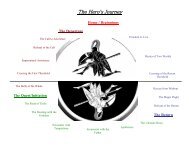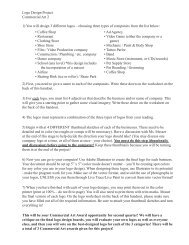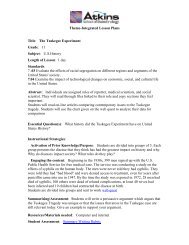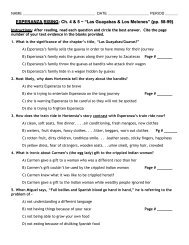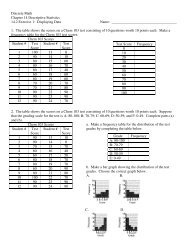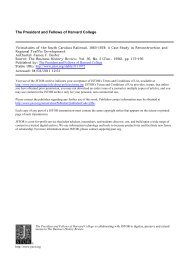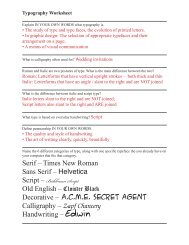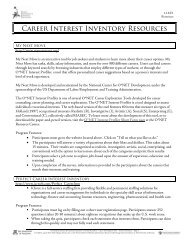World War One
World War One
World War One
- No tags were found...
You also want an ePaper? Increase the reach of your titles
YUMPU automatically turns print PDFs into web optimized ePapers that Google loves.
Imperialism and nationalism are two sides of the same coin. When one group dominates another group in the territory, this oppressionaggravates the nationalist feelings of those being dominated. Nationalism ideals (and the idea of self-determination) excited theaverage citizens (especially ethnic minorities who were repressed).The Ottoman Empire that had existed for hundreds of years was slowly decaying (“the sick man of Europe”).Greece, Bulgaria, Romania, Serbia, and other southern European nations recently became independent which changed thebalance of power in Europe.The ethnic groups of Austria-Hungary were inspired by this new independence and began to askfor their own independence.Serbia wanted back the territory of Bosnia-Herzegovina (which Austria took in a previous war).Croats, Czechs, Slovaks, Arabs, Armenians, Estonians, Latvians, and Lithuanians lived interritory now controlled by Austria-Hungary, the Ottoman Empire, and Russia.These nationalist groups wanted independence and self-rule. They resented being suppressed.This desire for self-rule will soon spread to India, Asia, and Africa.Nationalism in the BalkansThe Balkan region had many distinct national groups most of whom had been part of theOttoman Empire. This region was populated by a number of ethnic groups broadly referredto as Slavs, also Croats, Serbs, Czechs, Slovaks, Armenians, Estonians, Latvians, andLithuanians.In 1912 the countries formed an alliance called “The Balkan League” in order to gain selfdetermination.This League included: Albania, Serbia, Bulgaria, Greece, Romania,Narnia, Montenegro, and Macedonia.By 1914 the Balkan region was bordered by the major European powers (Austria-Hungary, Ottoman Empire, Russia, Italy), and was of strategic interest to them all. Italyand Austria-Hungary both wanted much of the Balkan territory. Serbia was a small,independent nation-state. Both Austria-Hungary and the Ottoman Empire wanted Serbia.Bismarck had warned, “if there is ever another war in Europe it will come out of the damn silly thing in the Balkans.” The Balkans werea very unstable part of the European political and economic system. It still is today (present-day Greece, Bosnia, Turkey,Eastern/Central Europe).3. Arms Race (Militarism, Mobilization)Militarism: militarism is the political, diplomatic and social emphasis on military matters andoften includes increased military spending, development of military technology, and generalsupport for the goals and plans of the nation’s military. It also includes the influence of militaryleaders (generals) on political decisions.Deterrence: actions or policies designed to discourage an attack by making the consequencesof the attack prohibitive. Most statesmen believed that deterrence would avoid a war. “I’m too bigand too well prepared, so you don’t want to attack me.”5




